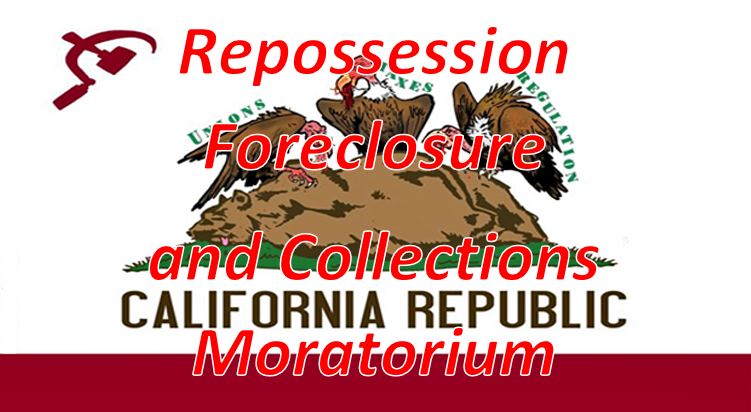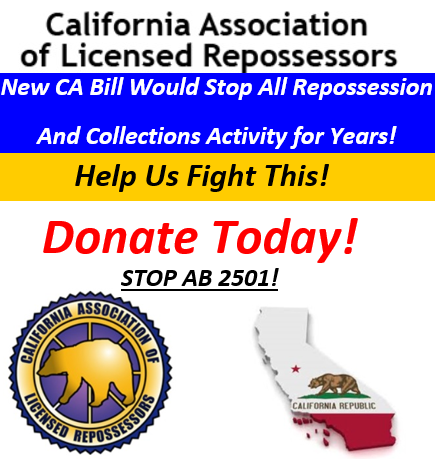
“Those forbearance periods shall continue to be extended upon request of the consumer up to a cumulative total of 270 days.”
Sacramento, CA – 8 June, 2020 – Having just cleared the Assembly Appropriations Committee last Wednesday and with revisions published last Friday, AB 2501 is moving quick and is on schedule to go up for vote today before the full house of the State Assembly! Needing a simple 41 vote majority to pass, sources suspect that it will breeze through the 80 seat assembly with some bipartisan opposition, but not enough to be defeated.
Over the weekend, the California State Assembly posted their schedule for bills to come to vote and AB 2501 appeared as item number 37. Whether or not it makes it to vote today or the day after is unknown, but it is on today’s calendar scheduled to open at 1pm, PST.
The full assembly meeting can be viewed online here.
The California State Assembly has eighty seats currently filled with 61 Democrats (76.3%), 17 Republicans (22.5%) and 1 Independent (1.3%). In order to pass, AB 2501 must only achieve a simple majority of 41.
Under normal conditions, by assembly procedure, a bill may not be brought to vote until 31 days after it is introduced and if pushed through under “Urgency Measures” would have required a 54 vote majority in the 80 seat house. But Assemblywoman Limon gutted out a trivial and completely unrelated bill that had been introduced in February and inserted this facsimile to the Waters Bill and Sherrod Bills which died with the “Heroes Act” in Congress last month.
AB 2501, titled “the COVID-19: homeowner, tenant, and consumer relief Law of 2020” , has been opposed by every major bank, credit union, finance and auto sales association in the state and has thus far been able to move through the first two lower committees with relative ease.
The California Credit Union League, a long-time beneficiary and supporter of the state’s Democratic Party, has rolled out massive grass roots efforts to defeat this bill. From CEO’s all the way down to tellers, credit union staff have been reaching out to the state Assemblypersons to express their concerns over this “Job Killer” bill just over the last few days.
The bill, drafted by California House Banking and Finance Committee Assemblywoman and Committee Chair, Monique Limon (D) of Santa Barbara and introduced on May 11th, is receiving heavy opposition from the California Chamber of Commerce, American Bankers Association (ABA), American Financial Services Association (AFSA), Bank Policy Institute (BPI), Credit Union National Association (CUNA), Housing Policy Council (HPC), Mortgage Bankers Association (MBA) and the Securities Industry and Financial Markets Association (SIFMA.)
On the May 17th, joint letter from the California Chamber of Commerce, American Bankers Association (ABA), American Financial Services Association (AFSA), Bank Policy Institute (BPI), Credit Union National Association (CUNA), Housing Policy Council (HPC), Mortgage Bankers Association (MBA) and the Securities Industry and Financial Markets Association (SIFMA), it was stated that;
“AB 2501 would undermine these ongoing efforts to help customers by creating duplicative and sometimes contradictory requirements for the mortgage and auto finance industries when viewed alongside federal rules, regulations and program requirements established by Congress, regulatory bodies, federal executive agencies, and government sponsored enterprises.”
In a more direct letter, the California Chamber of Commerce referred to the bill as “JOB KILLER” and that “Requiring these institutions to potentially go years without receiving payment is a significant burden that will negatively impact financial opportunities for Californians. Given the financial risk this proposal creates for such institutions, there is no question that the institutions will limit the mortgage and auto loans it offers. There will likely be stricter criteria to qualify, or, higher rates to offset the potential loss these institutions could suffer under AB 2501. This limitation will have a negative impact on the housing market, further exacerbating the housing crisis and creating job loss in the housing industry. It will also unquestionably limit car loans, especially for those with problematic credit history, and will harm both consumers and workers in the auto industry.”
While the larger national and state financial associations have considerable clout, they do not represent the expressed interests of the repossession industry and your support of the California Association of Licensed Repossessors (CALR) lobby is still very much needed. Please donate today!











